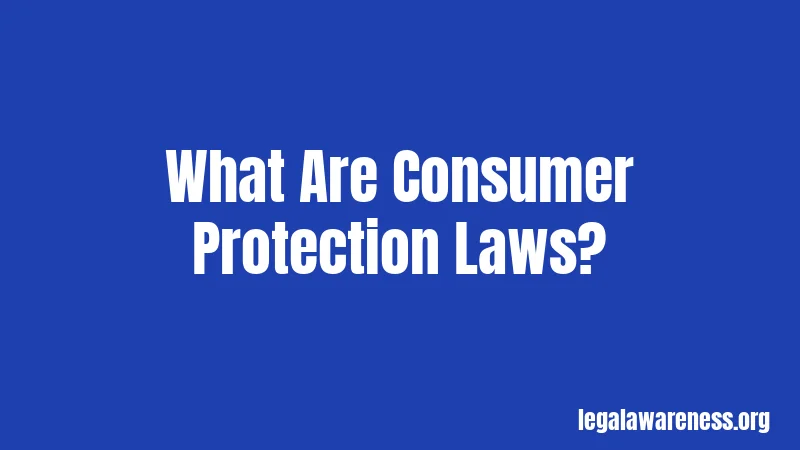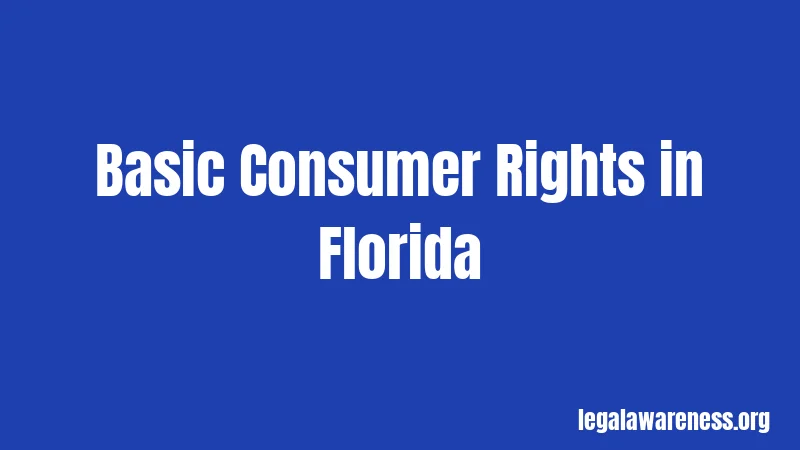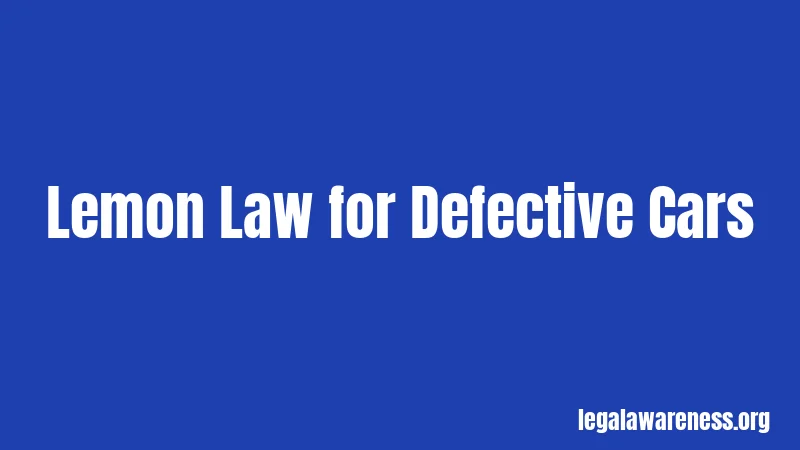Consumer Laws in Florida (2026): Your Rights & What’s Changing
Most people don’t realize how protected they actually are. Seriously. Florida has some pretty strong consumer laws that can save you thousands of dollars if you know about them. Let’s break down exactly what you need to know.
Here’s the deal. These laws cover everything from shady business practices to telemarketing calls that won’t stop. And honestly, knowing your rights can make a huge difference when things go wrong.
What Are Consumer Protection Laws?

Consumer protection laws stop businesses from ripping you off. That’s basically it. These rules make sure companies play fair when they sell you stuff or offer services.
The main law in Florida is called the Deceptive and Unfair Trade Practices Act. It’s a mouthful. Most people just call it FDUTPA. This law goes after businesses that lie, cheat, or use sketchy tactics to make money.
Right? Pretty straightforward.
How FDUTPA Protects You
FDUTPA bans unfair and deceptive business practices. What does that actually mean? It means companies can’t mislead you about what they’re selling.
False advertising is illegal. Bait-and-switch schemes are illegal. Hiding important information about a product is illegal too.
The law is intentionally broad. This helps catch all kinds of shady behavior. And trust me, people get creative when they’re trying to scam you.
Basic Consumer Rights in Florida

You have the right to honest information. Businesses must tell you the truth about their products and services. They can’t make up fake claims or leave out important details.
Wondering if this applies to you? It applies to everyone. Whether you’re buying a car, hiring a contractor, or signing up for a gym membership, these protections have your back.
Florida also has specific rules about returns and refunds. Here’s where it gets interesting. Stores don’t have to offer refunds unless they promise to. But if they say “no refunds,” they must post that policy where you can see it.
No sign posted? You can return unused items within seven days and get your money back. The store has 30 days to process your refund.
Telemarketing Laws That Actually Help
Those annoying sales calls. We all hate them. Florida takes telemarketing seriously, and the rules are stricter than federal law.
You can join Florida’s Do Not Call list for free. Once you’re on it, telemarketers can’t call you. Your number stays on the list forever unless you remove it yourself.
Here’s what else telemarketers can’t do. They can’t call before 8 a.m. or after 8 p.m. in your time zone. They can’t make more than three calls about the same thing in 24 hours. They can’t hide their caller ID.
And get this. Since July 2021, they need your written permission before using automated dialers. That includes robocalls and automated texts.
Break these rules? Companies face fines of up to $10,000 per violation. Sometimes more.
Lemon Law for Defective Cars

Bought a new car that’s constantly breaking down? Florida’s Lemon Law might help you get a refund or replacement.
The law covers new vehicles and demonstrator models. It protects you if your car has serious defects that hurt its safety, use, or value. These defects must show up within the first 24 months after you buy the car.
Okay, pause. Read this carefully. You need to report the problem during those first 24 months. After that window closes, the Lemon Law won’t cover you.
How many repair attempts trigger the law? Three attempts for the same problem. Or if your car sits in the shop for 30 days total. Either one qualifies.
The manufacturer gets one final chance to fix it. You must send them a written notice by registered or express mail. They have 10 days to set up the repair and 10 more days to actually fix it.
Still broken? You can request arbitration through the Florida New Motor Vehicle Arbitration Board. If they rule in your favor, you get either a replacement vehicle or a full refund.
Not sure what counts as a violation? Major engine problems count. Transmission failures count. Brake malfunctions definitely count. Any defect that makes the car unsafe or unusable can qualify.
Recent Changes Taking Effect in 2026
New consumer laws just took effect in January 2026. These changes affect several areas that might matter to you.
Medical billing overpayments now must be refunded. Pay the same medical bill twice by accident? The provider must return your money. This happens more often than you think.
Pet insurance rules got stricter. Insurance companies must clearly explain what’s covered and what’s not. No more hiding exclusions in tiny print.
Condominium associations face new requirements too. They must be more transparent about finances and major decisions. This protects condo owners from surprise assessments.
And here’s the big one. An animal abuser registry went live. The Florida Department of Law Enforcement now tracks people convicted of animal cruelty. Shelters can check this before letting someone adopt.
What Counts as Deceptive Business Practices
False claims about products or services. Making promises the business can’t keep. Hiding fees until after you’ve already committed.
Those are all violations. So is advertising a sale price but then claiming the item is “out of stock” to push more expensive options. That’s classic bait-and-switch.
Pyramid schemes are illegal. Misleading franchise opportunities are illegal. Travel scams that promise luxury vacations but deliver dumps are illegal too.
Honestly, this is the part most people miss. If a business makes you feel pressured or uses high-pressure tactics, that might violate consumer protection laws.
Penalties for Breaking Consumer Laws
Civil penalties can reach $10,000 per violation. For some violations, penalties go up to $15,000. When companies target senior citizens, disabled people, or military members, penalties double.
Companies can also face cease-and-desist orders. Courts can force them to stop the illegal behavior immediately. And victims can sue to get their money back.
Attorney General investigations are no joke. Since 2019, Florida’s Consumer Protection Division has recovered over $565 million. That includes more than $426 million paid directly to consumers who got ripped off.
Think of it like this. Breaking consumer protection laws costs businesses way more than playing fair.
Your Rights for Returns and Refunds
Stores can set their own return policies. But they must tell you about them clearly. If a store won’t accept returns, that policy must be posted where you can easily see it.
No policy posted anywhere? The law assumes returns are allowed. You can return undamaged, unused items within seven days. The business must process your refund within 30 days.
Extended warranties have their own rules. Florida requires a 30-day “free look” period. Cancel within 30 days and get a full refund if you haven’t filed any claims.
Sound complicated? It’s actually not. Just keep your receipts and read the return policy before you buy.
Telemarketing and Text Messages
Automated marketing texts need your permission. Not a vague opt-in buried in fine print. You must give clear, written consent that specifically allows automated messages.
You can revoke this permission anytime. Just text “STOP” back. The company has 15 days to stop texting you.
More than three texts in 24 hours? That’s a violation. Each unwanted text after you say stop? Another violation worth $500 to $1,500 in damages.
Stay with me here. If you’re getting bombarded with marketing texts, you might have a legal claim worth real money.
Health Studio and Gym Contracts
Signed up for a gym but changed your mind? Florida law gives you three days to cancel penalty-free. This applies to all health studio contracts.
The cancellation period doesn’t include holidays or weekends. So if you sign on Friday, you actually have until Wednesday to cancel.
Gyms must refund your money within 30 days of cancellation. They can only keep a small amount based on how many days passed since you signed.
Contracts can’t exceed 36 months initially. After that, they can only renew year by year. And you can’t be forced to sign a renewal more than 60 days before the old contract expires.
Pretty straightforward, right?
How to File a Consumer Complaint
First step? Try to resolve it directly with the business. Keep records of everything. Emails, receipts, contracts, text messages. All of it matters.
Document conversations too. Write down who you talked to, when you talked to them, and what they said. This creates a paper trail.
Still no resolution? File a complaint with the Florida Attorney General’s Consumer Protection Division. You can do this online, by email, or in person. It’s free.
The Attorney General investigates complaints. They look for patterns. If enough people complain about the same company, they might take legal action.
You can also contact your local Consumer Protection office. Many counties have their own consumer protection departments. They can help mediate disputes and sometimes recover money for you.
Contractor and Home Repair Protections
Home improvement contracts over $2,500 must be in writing. The contract must include the total price, payment schedule, and detailed description of the work.
Three-day cancellation period applies here too. You can cancel most home improvement contracts within three business days. The contractor must tell you about this right in writing.
Contractors must be licensed. Check their license before hiring anyone. Check their complaint history too. Florida’s Department of Business and Professional Regulation keeps records online.
Unlicensed contractors? Don’t hire them. Seriously. If something goes wrong, you have almost no legal recourse.
Credit Card and Payment Protections
Stores can’t charge extra for using credit cards. That’s called a surcharge, and it’s illegal in Florida unless the store clearly posts it.
Lost or stolen credit card? Your liability maxes out at $50. Most credit card companies waive even that if you report it quickly.
Billing errors must be investigated. If you dispute a charge, the credit card company has specific deadlines to respond and investigate.
You can also dispute charges for goods you didn’t receive or services that weren’t as described. The Fair Credit Billing Act protects you here.
Data Privacy and Security
Florida added data privacy rules in 2024. These went into effect July 1st. The law is narrower than some other states, but it still offers protection.
Companies must be transparent about collecting your personal data. They must explain what they collect and how they use it.
You have the right to know what data a company holds about you. You can request they delete it too. Companies must honor these requests within reasonable timeframes.
Security breaches must be reported. If your personal information gets hacked, the company must notify you. This lets you protect yourself from identity theft.
Filing a Lawsuit Under FDUTPA
You can sue companies that violate FDUTPA. You don’t even need the Attorney General’s permission.
To win, you must prove three things. The company engaged in deceptive or unfair practices. Those practices caused you harm. You suffered actual damages.
Actual damages means real financial loss. You can’t sue just because you’re annoyed. But if you lost money because of a company’s lies, you have a case.
Wondering if this applies to you? If you paid money based on false information and got something different than promised, you probably have a claim.
Courts can award attorney’s fees to the winning side. This means if you win, the company might have to pay your lawyer. If you lose and the court thinks your case was frivolous, you might pay their lawyers.
Special Protections for Vulnerable Groups
Laws protecting seniors and disabled people are tougher. Violate consumer protection laws against these groups and penalties double.
The law presumes certain people are vulnerable. Anyone 60 or older counts. People with disabilities count. Active military members and their families get extra protection too.
Scammers love targeting elderly people. The law knows this. That’s why the penalties are so much higher.
These cases get priority attention. The Attorney General’s office takes complaints involving vulnerable people very seriously.
Getting Help When You Need It
Free resources exist if you need help. The Attorney General’s Consumer Protection Division offers guidance and investigates complaints.
County consumer protection offices can help too. Many counties have dedicated staff to assist with consumer issues.
Legal aid organizations serve low-income Floridians. If you can’t afford a lawyer, they might help for free.
Consumer protection attorneys often work on contingency. That means they only get paid if you win. For FDUTPA cases, the losing side sometimes pays attorney fees.
The Better Business Bureau tracks complaints and mediates disputes. The Federal Trade Commission handles certain types of consumer fraud too.
What to Do If You’re Scammed
Act fast. Document everything immediately. Take screenshots, save emails, keep receipts. Evidence disappears quickly.
Report it to law enforcement if it’s serious fraud. File a complaint with the Attorney General. Contact your bank or credit card company to dispute charges.
Honestly, most people wait too long. Don’t do that. The sooner you act, the better your chances of recovering money.
Consider talking to a consumer protection lawyer. Many offer free consultations. They can tell you if you have a case worth pursuing.
Frequently Asked Questions
Can I get my money back if a store doesn’t post a return policy? Yes. If no policy is posted, Florida law assumes returns are allowed. You can return undamaged, unused items within seven days for a full refund.
How long can I cancel a gym membership in Florida? You have three business days to cancel any health studio contract penalty-free. After that, specific cancellation terms depend on your contract, but initial contracts can’t exceed 36 months.
What do I do about constant telemarketing calls? Register your number on Florida’s Do Not Call list and the National Do Not Call Registry. If calls continue, file complaints with the Florida Attorney General and possibly sue for statutory damages of $500-$1,500 per illegal call.
Does Florida’s Lemon Law cover used cars? No. Florida’s Lemon Law only covers new and demonstrator vehicles. However, used cars with warranties may be protected under federal law (Magnuson-Moss Warranty Act).
What are the penalties for businesses that violate consumer protection laws? Civil penalties range from $1,000 to $15,000 per violation. Violations against seniors, disabled people, or military members face doubled penalties. Courts can also order refunds and prohibit future violations.
Final Thoughts
Now you know the basics. Florida consumer protection laws exist to keep you safe from dishonest businesses. They work, but only if you know about them and use them.
Keep good records. Read contracts before signing. Don’t be afraid to ask questions. And if something feels wrong, it probably is.
Most importantly? Don’t let businesses take advantage of you. These laws give you real power. Use it when you need to.
References
- Florida Deceptive and Unfair Trade Practices Act (Chapter 501, Part II) – Official Florida Statutes
- Florida Attorney General Consumer Protection Division – State enforcement authority and complaint filing
- Florida Lemon Law Information – Official guidance from Florida Attorney General
- Florida Telemarketing Laws – Chapter 501, Part IV Florida Statutes
- Federal Trade Commission Consumer Protection – Federal consumer protection resources and complaint filing
